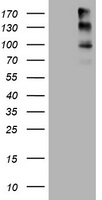ALK Mouse Monoclonal Antibody [Clone ID: OTI1A4]
USD 665.00
Specifications
| Product Data | |
| Clone Name | OTI1A4 |
| Applications | IHC, LMNX, WB |
| Recommended Dilution | WB 1:2000, IHC: 1:100 |
| Reactivities | Human, Mouse, Rat |
| Host | Mouse |
| Isotype | IgG2b |
| Clonality | Monoclonal |
| Immunogen | Human recombinant protein fragment corresponding to amino acids 1300-1620 of human ALK (NP_004295) produced in E.coli. |
| Formulation | PBS (PH 7.3) containing 1% BSA, 50% glycerol and 0.02% sodium azide. |
| Concentration | 0.5~1.0 mg/ml (Lot Dependent) |
| Purification | Purified from mouse ascites fluids or tissue culture supernatant by affinity chromatography (protein A/G) |
| Conjugation | Unconjugated |
| Storage | Store at -20°C as received. |
| Stability | Stable for 12 months from date of receipt. |
| Predicted Protein Size | 176.3 kDa |
| Gene Name | Homo sapiens ALK receptor tyrosine kinase (ALK), transcript variant 1, mRNA. |
| Database Link | |
| Background | This gene encodes a receptor tyrosine kinase, which belongs to the insulin receptor superfamily. This protein comprises an extracellular domain, an hydrophobic stretch corresponding to a single pass transmembrane region, and an intracellular kinase domain. It plays an important role in the development of the brain and exerts its effects on specific neurons in the nervous system. This gene has been found to be rearranged, mutated, or amplified in a series of tumours including anaplastic large cell lymphomas, neuroblastoma, and non-small cell lung cancer. The chromosomal rearrangements are the most common genetic alterations in this gene, which result in creation of multiple fusion genes in tumourigenesis, including ALK (chromosome 2)/EML4 (chromosome 2), ALK/RANBP2 (chromosome 2), ALK/ATIC (chromosome 2), ALK/TFG (chromosome 3), ALK/NPM1 (chromosome 5), ALK/SQSTM1 (chromosome 5), ALK/KIF5B (chromosome 10), ALK/CLTC (chromosome 17), ALK/TPM4 (chromosome 19), and ALK/MSN (chromosome X). [provided by RefSeq, Jan 2011] |
| Synonyms | CD246; NBLST3 |
| Note | The clone was previously sold as TA801287 before being upgraded to UltraMAB. |
| Reference Data | |
| Protein Families | Druggable Genome, Protein Kinase |
Documents
| Product Manuals |
| FAQs |
| SDS |
Resources
| Antibody Resources |
Other Versions
| SKU | Description | Size | Price |
|---|---|---|---|
| CF801287 | Carrier-free (BSA/glycerol-free) ALK mouse monoclonal antibody, clone OTI1A4 (formerly 1A4) |
USD 600.00 |
|
| TA801287 | ALK mouse monoclonal antibody, clone OTI1A4 (discontinued and upgraded to UltraMAB UM800118) |
USD 447.00 |
|
| TA801287S | ALK mouse monoclonal antibody, clone OTI1A4 (discontinued and upgraded to UltraMAB UM800118) |
USD 200.00 |
|
| UM800118CF | Carrier-free (BSA/glycerol-free) ALK mouse monoclonal antibody, clone OTI1A4 |
USD 614.00 |
|
| UM870118 | ALK mouse monoclonal antibody, clone OTI1A4 |
USD 180.00 |
{0} Product Review(s)
Although this KIT is prepared for human tissues, I have been using it for cat, dog, cow, sheep and buffalo tissues in my laboratory for years. It gives a very clean high signal in both types of tissues.
KIT causes background staining and nonspecific staining in rat and mouse tissues (plasmacytes and sera).
I usually use this KIT with citrate buffer pH6.0 or proteinase K enzyme digestion antegen retrieval methods. Sometimes I also use it with anti-goat antibodies in double staining.
Another important point is that it should be tried to incubate at the temperature and time written in the KIT, especially long strpteavidin-peroxidase (SA-HRP, third reagent) incubation causes background staining. Serum blocking reagent (pre-block) is also very effective.
Here is am adding an image of uroplakin III antibody staining with this KIT.
I hope it helps...
Associate Professor Mehmet Fatih Bozkurt, DVM, PhD.
Afyon Kocatepe University
Faculty of Veterinary Medicine.
Afyonkarahisar - Türkiye
+905318506172
fbozkurt@aku.edu.tr fbozkurt@gmail.com
www.immunohistokimya.net
Mehmet Fatih B. on 04/15/2023






























































































































































































































































 Germany
Germany
 Japan
Japan
 United Kingdom
United Kingdom
 China
China

















.jpg?d=110x110)



